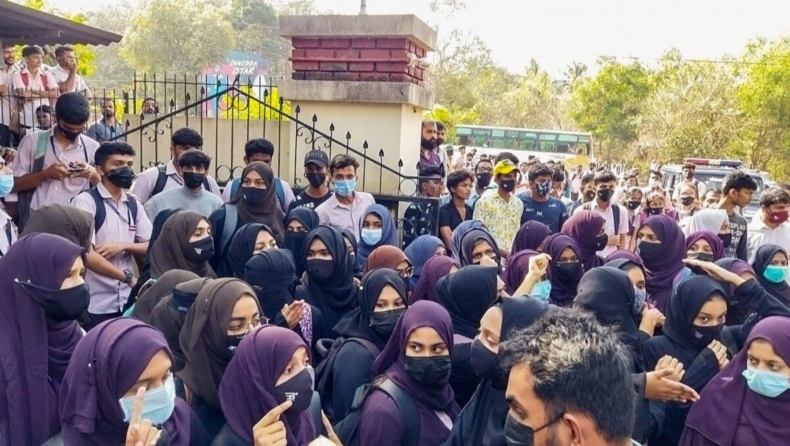After a single-judge bench of the Karnataka High Court decided to refer the pleas to a larger bench because the case involved larger Constitutional issues, the Chief Justice of Karnataka High Court on Wednesday formed a three-judge bench, including himself, to hear a batch of petitions challenging a ban on the use of hijabs in a few pre-university colleges in the state.
The three-judge court, known as a full bench of the High Court, will be led by Chief Justice Ritu Raj Awasthi and will comprise Justice Krishna S Dixit, who referred the case to a larger bench, and Justice Khazi Jaibunnisa Mohiuddin. Justice Mohiuddin is a female judge who was appointed to the High Court as an additional judge in March of last year.
On behalf of 18 girls from colleges in the Udupi district, the special bench will hear five petitions on the hijab issue on Thursday.
Significantly, the formation of a larger panel goes against Karnataka High Court guidelines, which state that only a two-judge court can refer a case to a full bench.
A layer of intra-court appeal is also removed with the larger bench hearing. A single-judge bench’s decision can be appealed to a two-judge High Court bench, while a full bench’s decision can only be contested in the Supreme Court.
HOW DID THE HIJAB CONTROVERSY START?
Six female students from the Government PU College for Girls in Udupi were not permitted to attend classes while wearing a hijab.
On December 31, 2021, the students protested, claiming that the college had denied them access to classes for the previous 15 days.
Raghupathi Bhat, MLA for Udupi BJP, who chairs the college’s development committee, met with parents and other stakeholders.
He instructed students to adhere to the college’s dress code in the classroom. Six students chose to remain absent from class.
The students filed a writ petition in the Karnataka High Court, as well as a complaint with the National Human Rights Commission.
WHAT PROMPTED OTHER EDUCATIONAL INSITITUTIONS TO BECOME INVOVLED?
Following this incident, a group of boys at Kundapur’s Government Pre University College wore saffron shawls to class in protest of some girls wearing hijab.
Kundapura MLA Haladi Srinivas Shetty met with parents and asked students to follow the college’s dress code until the government made a final decision on the matter.
The MLA stated that for the past five days, some female college students have been wearing hijab to class
The female students, on the other hand, have argued that they cannot be forced to leave the college because of a’sudden change in the dress code’ to prohibit hijab.
To counteract the hijab-wearing girls, several Hindu boys have appeared wearing saffron shawls, but they, too, have been barred from entering classrooms.
Such incidents have been reported in several colleges in the coastal Karnataka district of Udupi.
When students from IDSG Government First Grade College arrived in Chikkamagaluru wearing blue shawls, the row took a new turn. They raised their voices in support of Muslim girls and chanted Jai Bhim slogans. They stated that wearing a hijab in college as part of religious practice was acceptable.
WHAT DID THE GOVERNMENT SAY ABOUT THIS ?
The Karnataka Government issued an order requiring students to follow the uniform/dress code established by College Development Committees.
B.C. Nagesh, Minister of Primary and Secondary Education, stated that rules enacted under the Karnataka Educational Acts of 2013 and 2018 have empowered educational institutions to prescribe uniforms for school/PU college students.
Based on these rules, the department issued a circular and urged students to follow uniform rules imposed by colleges until the High Court issued its decision.
Though uniforms are not required in colleges, College Development Committees, often led by local MLAs, have insisted on a dress code, including the prohibition of hijabs, in Udupi and other districts.
Edited By: Mahi Gupta
Published By: Shramana Sengupta













